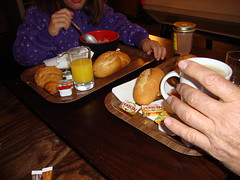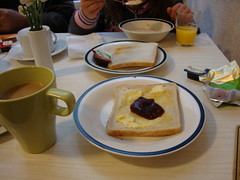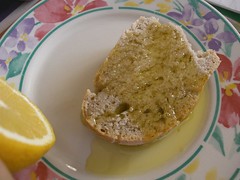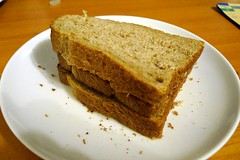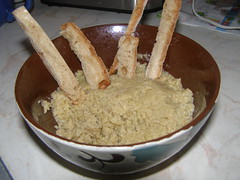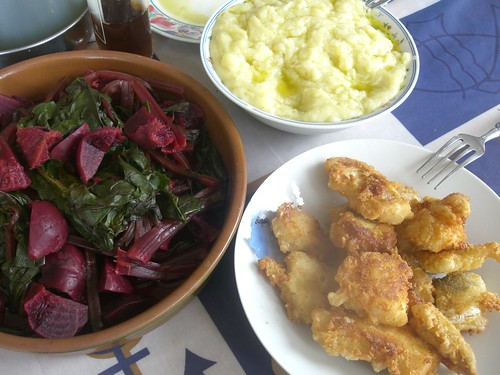This post also appears in Greek (scroll down), as translated for the local and Greek press, and published in websites (eg zarpanews).
Poverty, homelessness and hunger are all relative in the world today. The Mediterranean island town of Hania is not known for any one of these states of being. But there are always pockets of society that need more help than others, having reached a level close to one of these states of being for various reasons that cannot be easily explained. Many times, other problems that these people face have forced them into difficult circumstances which force them to experience a certain degree of poverty, homelessness and hunger, even though they may have a roof over their head.
Poverty, homelessness and hunger in Hania are all tackled in various ways. A number of state-sponsored schemes help people in need with basic food items and rent subsidisation. About 40 homeless people in the area are given shelter for the night at a children's summer campsite during the winter. And certainly, no one need go hungry in a food-rich society such as Hania, and Crete in general. One of the NGOs that help in this direction is the Κοινωνική Κουζίνα, the 'Social Kitchen" of Hania, which runs a small soup kitchen in the town centre on Tsouderon St.
In the frame of showing solidarity, last Friday, 1st of April, the graduate students of MAICh, in collaboration with the chef of the Institute and the President of the Cretan Gastronomy Network, undertook the preparation and distribution of 150 meals offered to the Social Kitchen of Hania. This is the second year that this event has taken place. As a local Institute with a strong multicultural character, MAICh's interconnection with the local community is a major component of academic and research activities, and welcomes initiatives promoting volunteer activities and community service. MAICh welcomes opportunities that make its multicultural character visible in the town.
Through this voluntary action, both MAICh and the students wanted to express their effective support for the work done by the Social Kitchen, their sympathy and solidarity with the underprivileged residents of our city. In the undoubtedly difficult times that we are living in, every citizen deserves the necessary support to allow them to live a dignified life. In this way, MAICh participated in and strengthened social structures based on the principles of collective responsibility and self-organization engaged in satisfying inalienable human rights, such as access to good nutrition.
Together with the MAICh chef Mr Yanis Apostolakis, the students organised themselves in small groups to provide help in the preparation of the meal, always in collaboration with the MAICh kitchen staff.
A decision was made to pack the portions individually, unlike last year when the pots full of food were taken to the Social Kitchen and distributed there. This indivudalisation of the portions added some cost and waste to the meal (in the form of packaging), but it was done with very good reason, in the belief that an individually wrapped meal will give some dignity to the recipients of the meal, so that they can take it away with them to eat in the comfort and privacy of the place they call home.
The Social Kitchen operates daily in Hania on a volunteer basis. Various people in the community prepare and cook meals in their homes, and take them to the Social Kitchen at serving time. Others collect food and ingredients which can be shared out to the recipients or used in the prepared meals. MAICh's contribution was made in the same way. When the time came for the food to be distributed, the students helped to load the food into the vehicles, and then to unload them at the Social Kitchen. It is not the Mediterranean way to provide cans and boxes of processed foods to feed the needy - people are given the same kind of food that people would prepare in their kitchens. Food banks also do not provide processed food to recipients of the scheme - they are more likely to be given the ingredients needed to cook a 'proper' meal (see: http://www.organicallycooked.com/2013/10/food-bank-community-grocery.html).
Recipients of the meals know when the Social Kitchen operates, and the students watched in trepidation as they arrived. Who are the poor of Hania? What do they look like? Why are they poor in such a food-rich society? For some of the meal recipients, the migration dream did not turn out well for them; most of the meal recipients were foreigners. But there were also some older Greeks, people who have ended up alone in their older age, people who do not make enough income to afford the necessities of life, people with a roof over their head but perhaps no power supply, people that lack the skills necessary to be able to look after themselves completely. The descent to personal chaos has many forms, and each case is unique. But the Social Kitchen is not there to question or judge; it simply provides a service that is needed, without any strings attached. It is not affiliated to any religious group.
The students of MAICh were surprised to realise that many of the recipients of the meals were in fact Middle Eastern/North Africans/Eastern Europeans like themselves. Most of this year's intake of MAICh students speak Arabic. Some come from Lebanon, a country with a refugee population ratio of 1:3 - Lebanon's population is around 4.5 million and it has 1.5 million registered refugees in the country which is roughly a little larger in size than the island of Crete (which has a permanent population of about 600,000). Some come from Palestine - Palestinians make up 600,000 of Lebanon's registered refugees. It is obvious that MAICh's students understand the refugee issue well.
The students regarded this event in a positive light, saying that they learnt a lot of things which they would not have known if they had not seen it for themselves. Poverty, homelessness and hunger are not always immediately visible, but we only need open our eyes to see what is happening and to be looking in the right places. The main thing is that almost everyone is in a position to help alleviate the effects of such situations, in their own personal way.
Learn more about the Social Kitchen of Hania - Μάθετε περισσότερα για την Κοινωνική Κουζίνα Χανίων:
website/ιστοσελίδα - http://koinonikikoyzina.blogspot.gr/
facebook - http://www.facebook.com/%CE%9A%CE%BF%CE%B9%CE%BD%CF%89%CE%BD%CE%B9%CE%BA%CE%AE-%CE%9A%CE%BF%CF%85%CE%B6%CE%AF%CE%BD%CE%B1-%CE%A7%CE%B1%CE%BD%CE%AF%CF%89%CE%BD-386558588039898/
©All Rights Reserved/Organically cooked. No part of this blog may be reproduced and/or copied by any means without prior consent from Maria Verivaki.
Poverty, homelessness and hunger are all relative in the world today. The Mediterranean island town of Hania is not known for any one of these states of being. But there are always pockets of society that need more help than others, having reached a level close to one of these states of being for various reasons that cannot be easily explained. Many times, other problems that these people face have forced them into difficult circumstances which force them to experience a certain degree of poverty, homelessness and hunger, even though they may have a roof over their head.
Poverty, homelessness and hunger in Hania are all tackled in various ways. A number of state-sponsored schemes help people in need with basic food items and rent subsidisation. About 40 homeless people in the area are given shelter for the night at a children's summer campsite during the winter. And certainly, no one need go hungry in a food-rich society such as Hania, and Crete in general. One of the NGOs that help in this direction is the Κοινωνική Κουζίνα, the 'Social Kitchen" of Hania, which runs a small soup kitchen in the town centre on Tsouderon St.
In the frame of showing solidarity, last Friday, 1st of April, the graduate students of MAICh, in collaboration with the chef of the Institute and the President of the Cretan Gastronomy Network, undertook the preparation and distribution of 150 meals offered to the Social Kitchen of Hania. This is the second year that this event has taken place. As a local Institute with a strong multicultural character, MAICh's interconnection with the local community is a major component of academic and research activities, and welcomes initiatives promoting volunteer activities and community service. MAICh welcomes opportunities that make its multicultural character visible in the town.
Today the students of MAICh spent their afternoon preparing meals for the town's Community Kitchen. In the early evening, they distributed it to those in most need.
Posted by Maria Verivaki on Friday, 1 April 2016
Through this voluntary action, both MAICh and the students wanted to express their effective support for the work done by the Social Kitchen, their sympathy and solidarity with the underprivileged residents of our city. In the undoubtedly difficult times that we are living in, every citizen deserves the necessary support to allow them to live a dignified life. In this way, MAICh participated in and strengthened social structures based on the principles of collective responsibility and self-organization engaged in satisfying inalienable human rights, such as access to good nutrition.
Together with the MAICh chef Mr Yanis Apostolakis, the students organised themselves in small groups to provide help in the preparation of the meal, always in collaboration with the MAICh kitchen staff.
A decision was made to pack the portions individually, unlike last year when the pots full of food were taken to the Social Kitchen and distributed there. This indivudalisation of the portions added some cost and waste to the meal (in the form of packaging), but it was done with very good reason, in the belief that an individually wrapped meal will give some dignity to the recipients of the meal, so that they can take it away with them to eat in the comfort and privacy of the place they call home.
The Social Kitchen operates daily in Hania on a volunteer basis. Various people in the community prepare and cook meals in their homes, and take them to the Social Kitchen at serving time. Others collect food and ingredients which can be shared out to the recipients or used in the prepared meals. MAICh's contribution was made in the same way. When the time came for the food to be distributed, the students helped to load the food into the vehicles, and then to unload them at the Social Kitchen. It is not the Mediterranean way to provide cans and boxes of processed foods to feed the needy - people are given the same kind of food that people would prepare in their kitchens. Food banks also do not provide processed food to recipients of the scheme - they are more likely to be given the ingredients needed to cook a 'proper' meal (see: http://www.organicallycooked.com/2013/10/food-bank-community-grocery.html).
Recipients of the meals know when the Social Kitchen operates, and the students watched in trepidation as they arrived. Who are the poor of Hania? What do they look like? Why are they poor in such a food-rich society? For some of the meal recipients, the migration dream did not turn out well for them; most of the meal recipients were foreigners. But there were also some older Greeks, people who have ended up alone in their older age, people who do not make enough income to afford the necessities of life, people with a roof over their head but perhaps no power supply, people that lack the skills necessary to be able to look after themselves completely. The descent to personal chaos has many forms, and each case is unique. But the Social Kitchen is not there to question or judge; it simply provides a service that is needed, without any strings attached. It is not affiliated to any religious group.
The students of MAICh were surprised to realise that many of the recipients of the meals were in fact Middle Eastern/North Africans/Eastern Europeans like themselves. Most of this year's intake of MAICh students speak Arabic. Some come from Lebanon, a country with a refugee population ratio of 1:3 - Lebanon's population is around 4.5 million and it has 1.5 million registered refugees in the country which is roughly a little larger in size than the island of Crete (which has a permanent population of about 600,000). Some come from Palestine - Palestinians make up 600,000 of Lebanon's registered refugees. It is obvious that MAICh's students understand the refugee issue well.
The students regarded this event in a positive light, saying that they learnt a lot of things which they would not have known if they had not seen it for themselves. Poverty, homelessness and hunger are not always immediately visible, but we only need open our eyes to see what is happening and to be looking in the right places. The main thing is that almost everyone is in a position to help alleviate the effects of such situations, in their own personal way.
Κοινωνική Κουζίνα Χανίων – ΜΑΡΙΑ ΒΕΡΙΒΑΚΗ,
ΚΑΘΗΓΗΤΡΙΑ ΑΓΓΛΙΚΩΝ, ΜΑΙΧ
Η φτώχεια, η έλλειψη
στέγης και η πείνα είναι καταστάσεις οι οποίες εμφανίζονται όλο και συχνότερα στο σύγχρονο κόσμο, ίσως για να μας
θυμίσουν πως η ανάπτυξη της τεχνολογίας δεν αρκεί για την καταπολέμησή τους.
Στα Χανιά, μέχρι σήμερα,
τα φαινόμενα αυτά δεν είχαν λάβει μεγάλη έκταση (όπως σε άλλες μεγαλουπόλεις της Ευρώπης). Ωστόσο, υπάρχουν πάντα 'τμήματα' μέσα στην κοινωνία
μας που χρειάζονται περισσότερη βοήθεια απ’ ότι άλλοι άνθρωποι, έχοντας φτάσει σε
οριακό σημείο, για διάφορους λόγους που δεν μπορούν εύκολα να εξηγηθούν. Πολλές
φορές, τα προβλήματα που αυτοί οι
άνθρωποι αντιμετωπίζουν, τους αναγκάζουν να ζητήσουν βοήθεια στις δύσκολες
περιστάσεις που βιώνουν.
Είναι αυτονόητο, βέβαια ότι
δεν χρειάζεται να πεινάσει κανείς σε μια κοινωνία όπως τα Χανιά όπου είναι
πλούσια σε τρόφιμα, όπως και στην Κρήτη γενικότερα. Μία από τις εθελοντικές
οργανώσεις που βοηθούν προς αυτή την
κατεύθυνση αυτή είναι η Κοινωνική Κουζίνα Χανίων, στην οποία λειτουργεί ένα
μικρό συσσίτιο στο κέντρο της πόλης στην οδό Τσουδερών.
Την Παρασκευή 1η Απριλίου
2016, οι μεταπτυχιακοί φοιτητές του ΜΑΙΧ σε συνεργασία με τον Σεφ του
Ινστιτούτου και Πρόεδρο του Δικτύου Κρητικής Γαστρονομίας, ετοίμασαν ένα γεύμα
(150 μερίδες), που πρόσφεραν στην Κοινωνική Κουζίνα Χανίων. Το Ινστιτούτο και
οι μεταπτυχιακοί φοιτητές του, μέσω της εθελοντικής αυτής δράσης θέλουν να
εκφράσουν την έμπρακτη στήριξή τους στο έργο της Κοινωνικής Κουζίνας, τη
συμπαράσταση και αλληλεγγύη τους προς τους άπορους κατοίκους της πόλης μας.
Είναι η δεύτερη χρονιά που η εκδήλωση αυτή έλαβε χώρα.
Στις αναμφισβήτητα
δύσκολες εποχές που ζούμε, αξίζει να υποστηρίζουμε, να συμμετέχουμε και να
ενισχύουμε κοινωνικές δομές που βασίζονται στις αρχές της συλλογικότητας της
αλληλεγγύης και της αυτό-οργάνωσης που δραστηριοποιούνται στην ικανοποίηση των
αναφαίρετων δικαιωμάτων του ανθρώπου, όπως η σίτιση, εργασία, παιδεία, υγεία. Άλλωστε,
το ΜΑΙΧ, ένα διεθνές μεταπτυχιακό Ινστιτούτο με έντονο πολυπολιτισμικό χαρακτήρα,
αντιμετωπίζει τη διασύνδεση του με την τοπική κοινωνία ως κύριο συστατικό των
ακαδημαϊκών και ερευνητικών του δραστηριοτήτων και χαιρετίζει πρωτοβουλίες και
δράσεις εθελοντισμού και κοινωνικής προσφοράς. Με τον τρόπο αυτό, το ΜΑΙΧ
συμμετέχει και ενισχύει τις κοινωνικές δομές που βασίζονται στις αρχές της
συλλογικής ευθύνης που ασχολούνται με την ικανοποίηση των αναφαίρετων
δικαιωμάτων του ανθρώπου, όπως είναι η πρόσβαση στην σωστή διατροφή.
Μαζί με τον Σεφ του ΜΑΙΧ,
κ Γιάννη Αποστολάκη, οι φοιτητές οργανώθηκαν σε μικρές ομάδες για να παρέχουν
βοήθεια στην προετοιμασία του γεύματος, πάντα σε συνεργασία με το προσωπικό της
κουζίνας του ΜΑΙΧ. Αποφασίστηκε να συσκευαστεί το γεύμα σε ξεχωριστές μερίδες, με την πεποίθηση ότι μια ατομική συσκευασία
γεύματος μπορεί να δώσει κάποια αξιοπρέπεια στους αποδέκτες του, με την έννοια
ότι θα μπορέσουν να το πάρουν μαζί τους
για να το φάνε σε ένα δικό τους χώρο, όπου θα υπάρχει άνεση και ιδιωτικότητα,
ένα οικείο περιβάλλον που για αυτούς αποτελεί το σπίτι τους.
Η Κοινωνική Κουζίνα
λειτουργεί καθημερινά στα Χανιά σε εθελοντική βάση. Διάφοροι άνθρωποι προετοιμάζουν και μαγειρεύουν τα γεύματα στα
σπίτια τους, και μετά τα μεταφέρουν στην Κοινωνική Κουζίνα την ώρα που γίνεται
η διανομή. Άλλοι συλλέγουν τρόφιμα και συστατικά που μπορεί να διανεμηθούν στους
δικαιούχους ή να χρησιμοποιηθούν στην
ετοιμασία γευμάτων. Η συνεισφορά του ΜΑΙΧ έγινε με παρόμοιο τρόπο. Όταν ήρθε η
ώρα να διανεμηθεί το φαγητό, οι φοιτητές βοήθησαν να φορτώσουν τα πακέτα στα
οχήματα, και στη συνέχεια να τα πάνε στην Κοινωνική Κουζίνα. Δεν είναι στο
πνεύμα του Μεσογειακών λαών να παρέχουν κονσέρβες και κουτιά επεξεργασμένων
τροφίμων για να ταΐζονται οι άποροι. Είναι πιο ανθρώπινο και σίγουρα
συνυφασμένο με την κουλτούρα μας να προσφέρουμε το ίδιο είδος φαγητού που και
εμείς θα προετοιμάζαμε στις κουζίνες μας.
Οι παραλήπτες των
γευμάτων ξέρουν τις ώρες που λειτουργεί η Κοινωνική Κουζίνα, και οι φοιτητές τους παρακολούθησαν όπως έφταναν. Ποιοι είναι άραγε οι άποροι
των Χανίων; Γιατί δεν έχουν να φάνε σε μια τέτοια κοινωνία πλούσια σε τρόφιμα
και υλικά αγαθά; Για μερικούς από τους αποδέκτες τους γεύματος, το όνειρο της
μετανάστευσης δεν πήγε καλά. Οι περισσότεροι από τους παραλήπτες ήταν
αλλοδαποί. Αλλά υπήρχαν και Έλληνες, άνθρωποι που έχουν καταλήξει μόνοι τους
στη ζωή, άνθρωποι που ίσως δεν έχουν αρκετά έσοδα για να ανταποκριθούν στις
ανάγκες της καθημερινότητας, άνθρωποι που μένουν σε σπίτια που μοιάζουν σαν τα
δικά μας, αλλά ίσως δεν έχουν πια παροχή ηλεκτρικού ρεύματος λόγω χρεών,
άνθρωποι που στερούνται τις δεξιότητες που είναι απαραίτητες για να μπορούν να
φροντίσουν τον εαυτό τους. Η πορεία του κάθε ανθρώπου στο προσωπικό χάος που
ζει έχει πολλές μορφές, και η κάθε περίπτωση είναι μοναδική. Αλλά ο ρόλος της
Κοινωνικής Κουζίνας δεν είναι ρόλος δικαστή, δεν κρίνει, δεν αμφισβητεί. Απλώς παρέχει μια υπηρεσία που είναι
απαραίτητη, χωρίς δεσμεύσεις. Δεν είναι συνδεδεμένη με καμιά θρησκευτική ομάδα,
εθνότητα, χρώμα και φυλή.
Οι φοιτητές του ΜΑΙΧ
έμειναν έκπληκτοι όταν συνειδητοποίησαν ότι, εκτός από Έλληνες, αρκετοί από
τους παραλήπτες των γευμάτων ήταν από την Μέση Ανατολή, την Βόρεια Αφρική και
την Ανατολική Ευρώπη. Δηλαδή προέρχονταν από τις ίδιες χώρες με αυτές των φοιτητών! Αρκετοί
φοιτητές του ΜΑΙΧ μιλούν αραβικά. Μερικοί έρχονται από το Λίβανο, μια χώρα με
αναλογία προσφύγων 1: 3 - ο πληθυσμός
του Λιβάνου είναι περίπου 4,5 εκατομμύρια ενώ υπάρχουν 1,5 εκατομμύριο
εγγεγραμμένοι πρόσφυγες στη χώρα αυτή που είναι περίπου λίγο μεγαλύτερη σε
μέγεθος από την Κρήτη. Μερικοί έρχονται επίσης από την Παλαιστίνη - οι
Παλαιστίνιοι συνθέτουν αριθμό 600.000 επί των εγγεγραμμένων προσφύγων του Λιβάνου. Είναι
προφανές ότι οι φοιτητές του ΜΑΙΧ έχουν καλή κατανόηση του προσφυγικού θέματος.
Οι φοιτητές αποκόμισαν
πολλά από την προετοιμασία της προσφοράς αυτή. Ήταν γι’ αυτούς μια εμπειρία
μοναδική με ιδιαίτερη συναισθηματική φόρτιση. Η φτώχεια, η έλλειψη στέγης και η πείνα δεν
είναι πάντα άμεσα ορατά, αλλά το μόνο που χρειάζεται κανείς για να τα δει είναι
να ανοίξει τα μάτια του για να δει τι συμβαίνει και να αναζητήσει τρόπους για
να επιλυθούν τα προβλήματα. Το σημαντικότερο είναι ότι σχεδόν όλοι μας είμαστε
σε θέση να συμβάλλουμε στην άμβλυνση των επιπτώσεων τέτοιων καταστάσεων, με το
δικό μας προσωπικό τρόπο.
Learn more about the Social Kitchen of Hania - Μάθετε περισσότερα για την Κοινωνική Κουζίνα Χανίων:
website/ιστοσελίδα - http://koinonikikoyzina.blogspot.gr/
facebook - http://www.facebook.com/%CE%9A%CE%BF%CE%B9%CE%BD%CF%89%CE%BD%CE%B9%CE%BA%CE%AE-%CE%9A%CE%BF%CF%85%CE%B6%CE%AF%CE%BD%CE%B1-%CE%A7%CE%B1%CE%BD%CE%AF%CF%89%CE%BD-386558588039898/
©All Rights Reserved/Organically cooked. No part of this blog may be reproduced and/or copied by any means without prior consent from Maria Verivaki.










 The omelette didn't get a chance to be photographed - it went as quickly as these kalitsounia did once they were cooked (my little pies with
The omelette didn't get a chance to be photographed - it went as quickly as these kalitsounia did once they were cooked (my little pies with 
